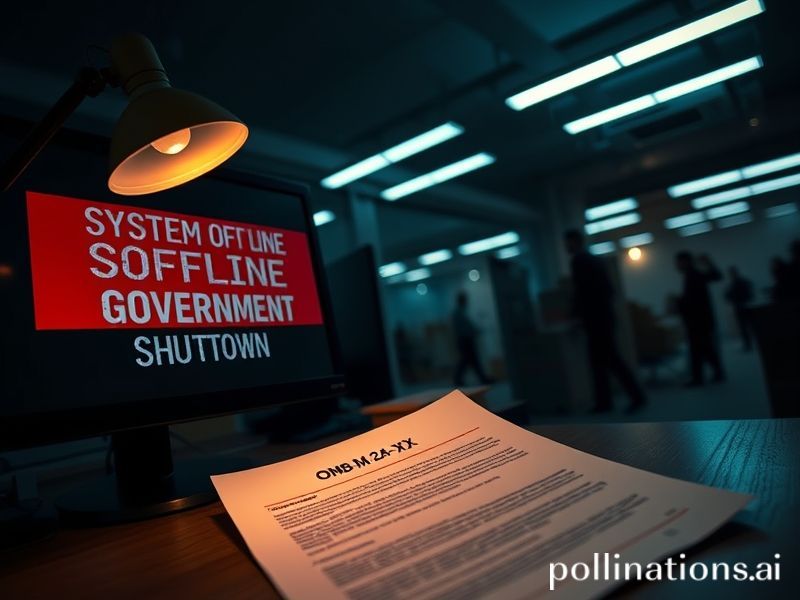Global Eye-Roll: How One OMB Memo Turned the Planet into a Cynical Bystander of America’s Shutdown Ritual
GENEVA—While Washington practiced its favorite ritual dance of self-immolation last weekend, the rest of the planet watched with the same polite horror one reserves for a tipsy uncle lighting the Christmas pudding a little too enthusiastically. The Office of Management and Budget’s 127-page shutdown memo—equal parts bureaucratic lullaby and fiscal ransom note—was greeted from Nairobi trading floors to Seoul chip fabs with the weary shrug of people who have seen this movie before, own the T-shirt, and are already streaming the sequel.
Let us be clear: nothing actually shut down for long. The memo merely instructed federal agencies to rehearse their ghost-town choreography—close the passport office, padlock Yosemite, send the statisticians home so nobody can count how broke we are. Still, the ripple effects were instant. In Brussels, NATO planners quietly moved coffee money into euros in case the Pentagon’s travel office went on furlough mid-summit. Ghana’s cocoa board delayed a $1.2 billion hedge because the U.S. Commodity Futures Trading Commission might not answer its phone. And over in Basel, the Bank for International Settlements added another asterisk to its global-risk dashboard: “American political entropy, recurring.”
The memo itself is a masterpiece of passive aggression. Section 3(B)(ii) reminds agencies that “excepted” workers—those deemed essential to life, liberty, and the smooth operation of the IRS—must keep toiling without pay “in the interest of national security.” Translation: the people who actually keep the lights on become indentured civil servants until Congress remembers where it left its spine. Meanwhile, the Smithsonian’s Twitter account went dark for exactly 48 hours, a silence interpreted by some foreign policy wonks as a subtle cry for help spelled out in 280-character Morse code.
Financial markets, those finely tuned barometers of human delusion, barely twitched. The dollar dipped, then rebounded when traders remembered that every other major economy is also busy sawing off its own foot, just more quietly. Tokyo’s Nikkei rose on the theory that a paralyzed U.S. government can’t start any new trade wars this week, while Shanghai’s state media ran editorials praising “the resilience of American institutions” with the kind of sincerity usually reserved for hostage videos.
Europe, having perfected the art of governing by crisis, offered gentle counsel. A spokesman for the European Commission—speaking on condition of anonymity lest his own coalition collapse before dessert—said Brussels “notes the temporary nature of the disruption,” which is diplomat-speak for “bless your heart.” The eurozone, still bailing out its fifteenth consecutive Greek summer, knows that shutdown theater is merely America’s way of reminding the world who still owns the reserve currency and the aircraft carriers that guard it.
Emerging markets, meanwhile, treat every U.S. shutdown like a flash sale. Brazil’s central bank quietly extended swap lines to local exporters who suddenly can’t get letters of credit confirmed by Washington-based banks. Indian IT firms dusted off contingency plans to reroute H-1B paperwork through Canadian subsidiaries—Toronto’s gain, Silicon Valley’s mild headache. And in Lagos, fintech startups offered “Shutdown Insurance” policies pegged to the length of the impasse; payouts triggered if the U.S. government stays closed longer than the average Nollywood miniseries.
Yet beneath the global eye-rolling lies a sobering truth: the world’s indispensable nation is increasingly the unreliable one. Each memo-fueled rehearsal erodes the soft power that once made American advice worth heeding. When USAID can’t cut checks, dengue programs stall from Honduras to Jakarta. When the FAA furloughs safety inspectors, airlines from Bogotá to Bangkok recalculate risk margins. The ledger of inconvenience is long, diffuse, and ultimately written in lives rather than headlines.
By Monday evening, a stopgap bill materialized like a pizza coupon slipped under the door: 45 days of funding, zero solutions, 100 percent post-dated drama. The OMB’s memo was quietly filed next to last season’s hurricane plans and the Y2K survival manual. Abroad, the reaction was best captured by a Nairobi headline: “America Ends Vacation from Itself—World Pretends to Be Relieved.”
In the end, the shutdown that wasn’t taught the same lesson as the pandemic that was: modern civilization is held together by people too essential to stay home, and too polite to point out the absurdity of the arrangement. The next memo is already queued, the next deadline circled in red. Somewhere, a Swiss banker updates the counter on his Bloomberg terminal: “Days Since Last U.S. Fiscal Self-Own: 0.” The world sighs, refreshes its browser, and gets back to work.







